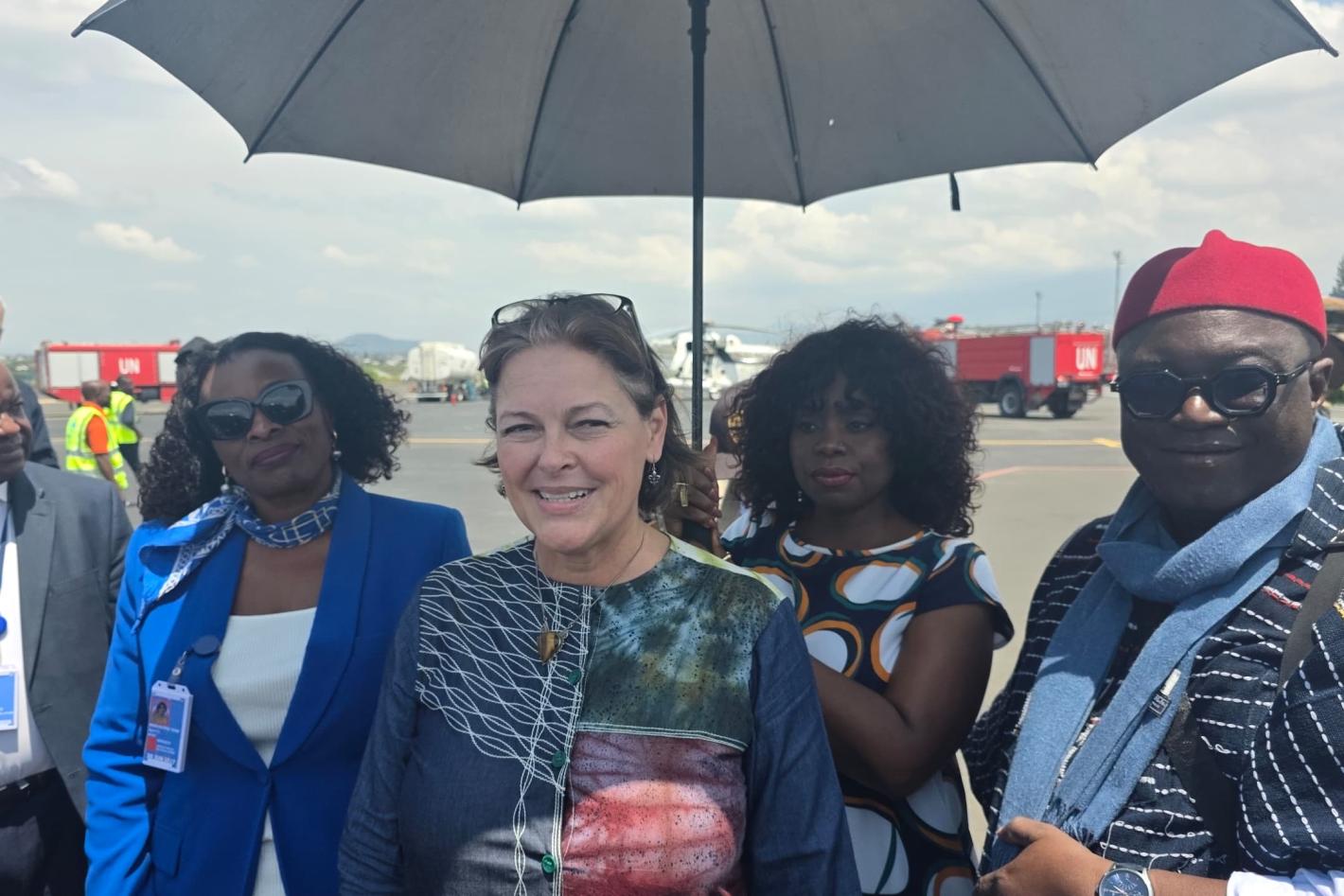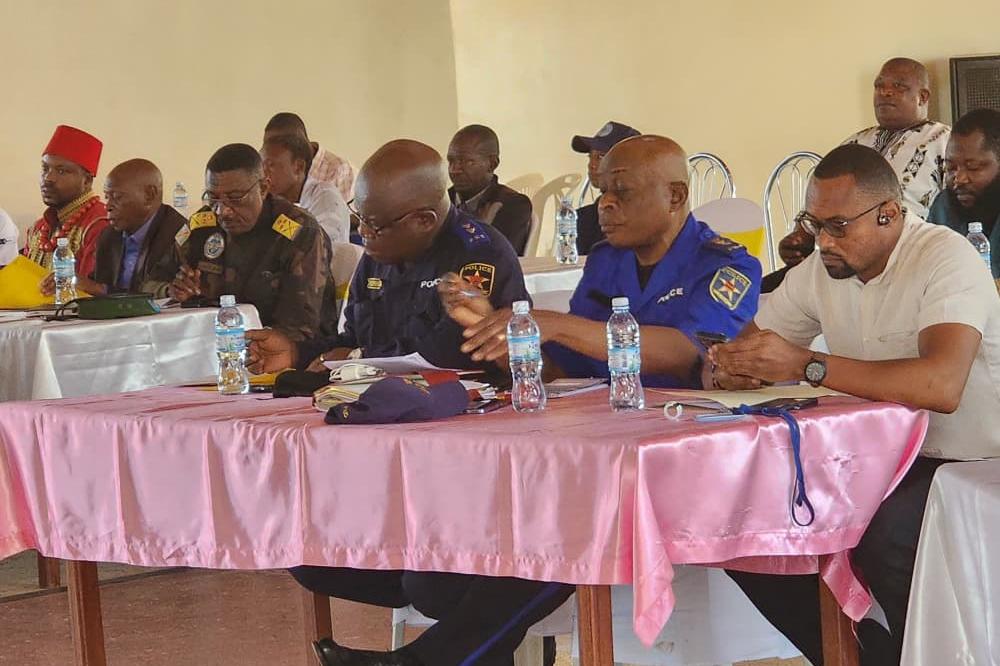Goma – 19 August, 2015 - Munigi is a settlement just outside of Goma, the North Kivu’s Provincial capital where MONUSCO has constructed a transit camp to ease the disarmament process and to help reintegrate the rebels who have voluntarily surrendered to go back to mainstream community.When the HIV and AIDS team visited the camp for HIV sensitization and awareness activities, groups of young people and children were sitting under the early morning sun, while others were moving around the camp with younger ones fetching water in plastic buckets.
Among them was a woman sitting alone under a tent. These people are the former rebels, known as ex-combatants. They have just abandoned rebel groups to follow the reintegration process back to normal life. In their words, “we are tired of living in the jungle and now want to return to our community”. That is why they are here - ready to get more information on HIV and to do our HIV test”.
As soon as the HIV sensitization activities began, many of them looked anxious with a clear sense of relief. They lined up, ready to take part in the sensitization campaign. All of them showed signs of readiness to get more information on HIV and to do their HIV voluntary confidential counseling and testing (VCCT).
“This morning looks quite different”, says one of them in a barely audible voice. “Our life is changing already. We are going to do our HIV test now”, he says with a smile.
Most of them who are in this transit camp are young people and children. They have been fighting the government forces alongside rebel groups since conflict broke out in the DRC more than a decade ago.
For several years now and through the reintegration process, most of the surrendered rebels have gone back to their homeland. Amisi Germain, a father of seven left his family to join the rebel group some years back. He told us that he was already tired of life in the jungle and had to escape to benefit from the reintegration process. According to him, life in the jungle is tough as they live in poor conditions - with no regular feeding, shelter, and medical care.
“We were not being paid the amount of money the rebel leader promised us”, he confirms, insisting that he was very happy to know his HIV status. “I am ready to go back home to my wife and children. I want to advice those who are still hiding in the jungle to follow my example and go back to normal life”, he says showing signs of regrets.
The most disturbing issue here is that of children being recruited by rebel groups. The HIV sensitization activities started with more than a hundred ex-combatants including dozens of children. The youngest among them was barely 11 years old. He could not express himself properly, but his only wish, he says, is to go back to school. As he waited alongside scores of others to receive their HIV test, he did not know why he was lured away from their home to the jungle by some men unknown to him.
The only woman among them stared into the distance as if her thoughts were anywhere but on the HIV test results she was about to receive. Her job with the rebels, she says, was to cook food for the group. According to her, poor living conditions and bad treatment from the rebels forced her to leave. Though she did not explain how bad her treatment was, it is suggested she was assaulted sexually since rape is a common practice among rebel groups.
“I am happy to be here now. I will like to be a tailor once I go home", she whispered in response to our questions. "I am not married, but I hope to do so once I am out of here”, she guessed.
Many of those escaping from the rebel groups in the DRC speak of witnessing atrocities during their flight to safety. The reintegration process makes sure that the ex-combatants do not face a difficult future once they move back to their homeland, one official in charge of the process confirmed. Most of them like Amisi are quite destitute and do not have personal belongings. Amisi owns a telephone but says he lacks the means to inform his friends of the good life he now enjoys in Munigi.
“We eat three times a day and we also sleep under mosquito nets. We are even given tooth brushes”, he appreciates, while thanking MONUSCO for providing them with such services. “I can now know my HIV status. This is good news for my family too”, he says thankfully.
They are slowly being dispersed into mainstream community, but with little to offer. Most of them say they would seek out relatives for help once they get back home.
“My children are staying with my sister in-law”, says one of them with a lot of remorse. “I fled my village to join the rebels, leaving behind my family, all the good memories, and a life’s possessions. I want to thank MONUSCO for the good living conditions we are having here and for helping us to know more about HIV and AIDS’, he concludes.
By Joseph Tabung Banah
Among them was a woman sitting alone under a tent. These people are the former rebels, known as ex-combatants. They have just abandoned rebel groups to follow the reintegration process back to normal life. In their words, “we are tired of living in the jungle and now want to return to our community”. That is why they are here - ready to get more information on HIV and to do our HIV test”.
As soon as the HIV sensitization activities began, many of them looked anxious with a clear sense of relief. They lined up, ready to take part in the sensitization campaign. All of them showed signs of readiness to get more information on HIV and to do their HIV voluntary confidential counseling and testing (VCCT).
“This morning looks quite different”, says one of them in a barely audible voice. “Our life is changing already. We are going to do our HIV test now”, he says with a smile.
Most of them who are in this transit camp are young people and children. They have been fighting the government forces alongside rebel groups since conflict broke out in the DRC more than a decade ago.
For several years now and through the reintegration process, most of the surrendered rebels have gone back to their homeland. Amisi Germain, a father of seven left his family to join the rebel group some years back. He told us that he was already tired of life in the jungle and had to escape to benefit from the reintegration process. According to him, life in the jungle is tough as they live in poor conditions - with no regular feeding, shelter, and medical care.
“We were not being paid the amount of money the rebel leader promised us”, he confirms, insisting that he was very happy to know his HIV status. “I am ready to go back home to my wife and children. I want to advice those who are still hiding in the jungle to follow my example and go back to normal life”, he says showing signs of regrets.
The most disturbing issue here is that of children being recruited by rebel groups. The HIV sensitization activities started with more than a hundred ex-combatants including dozens of children. The youngest among them was barely 11 years old. He could not express himself properly, but his only wish, he says, is to go back to school. As he waited alongside scores of others to receive their HIV test, he did not know why he was lured away from their home to the jungle by some men unknown to him.
The only woman among them stared into the distance as if her thoughts were anywhere but on the HIV test results she was about to receive. Her job with the rebels, she says, was to cook food for the group. According to her, poor living conditions and bad treatment from the rebels forced her to leave. Though she did not explain how bad her treatment was, it is suggested she was assaulted sexually since rape is a common practice among rebel groups.
“I am happy to be here now. I will like to be a tailor once I go home", she whispered in response to our questions. "I am not married, but I hope to do so once I am out of here”, she guessed.
Many of those escaping from the rebel groups in the DRC speak of witnessing atrocities during their flight to safety. The reintegration process makes sure that the ex-combatants do not face a difficult future once they move back to their homeland, one official in charge of the process confirmed. Most of them like Amisi are quite destitute and do not have personal belongings. Amisi owns a telephone but says he lacks the means to inform his friends of the good life he now enjoys in Munigi.
“We eat three times a day and we also sleep under mosquito nets. We are even given tooth brushes”, he appreciates, while thanking MONUSCO for providing them with such services. “I can now know my HIV status. This is good news for my family too”, he says thankfully.
They are slowly being dispersed into mainstream community, but with little to offer. Most of them say they would seek out relatives for help once they get back home.
“My children are staying with my sister in-law”, says one of them with a lot of remorse. “I fled my village to join the rebels, leaving behind my family, all the good memories, and a life’s possessions. I want to thank MONUSCO for the good living conditions we are having here and for helping us to know more about HIV and AIDS’, he concludes.
By Joseph Tabung Banah






